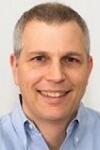Robert Schoelkopf
The development of solid-state quantum bits (qubits) for quantum computing, and the advancement of their performance to practical levels
Robert Schoelkopf is the Sterling Professor of Applied Physics and Physics at Yale University. His research focuses on the development of superconducting devices for quantum information processing, which are leading to revolutionary advances in computing.
His group is a leader in the development of solid-state quantum bits (qubits) for quantum computing, and the advancement of their performance to practical levels. Together with his collaborators at Yale, Professors Michel Devoret and Steve Girvin, their team created the new field of “circuit quantum electrodynamics,” which allows quantum information to be distributed by microwave signals on wires. His lab has produced many firsts in the field based on these ideas, including the development of a “quantum bus” for information, and the first demonstrations of quantum algorithms and quantum error correction with integrated circuits.
A graduate of Princeton University, Schoelkopf earned his Ph.D. at the California Institute of Technology. From 1986 to 1988 he was an electrical/cryogenic engineer in the Laboratory for High-Energy Astrophysics at NASA’s Goddard Space Flight Center, where he developed low-temperature radiation detectors and cryogenic instrumentation for future space missions.
Schoelkopf, who came to Yale as a postdoctoral researcher in 1995, joined the faculty in 1998, becoming a full professor in 2003. He is also the Director of the Yale Quantum Institute.
Professor Schoelkopf has been recognized as a fellow of both the American Association for the Advancement of Science and the American Physical Society. In 2009, he was awarded the Joseph F. Keithley Award of the American Physical Society for the development of high-frequency measurement techniques to probe quantum devices and nanostructures, and in 2013 he shared, with his colleague Michel Devoret, the John Stewart Bell Prize for fundamental and pioneering experimental advances in superconducting qubits. In 2014 he received, together with Devoret and John Martinis (UCSB), the Fritz London Memorial Prize for Low Temperature Physics. In 2015, Professor Schoelkopf was elected to the National Academy of Science.
Responsibilities:
Sterling Professor of Applied Physics and Physics
Director of the Yale Quantum Institute
Schoelkopf focuses on quantum transport, single-electron devices, and charge dynamics in nanostructures. Broadly put, his research is concerned with quantum-effect and single-electron devices, both for fundamental physical studies and for applications. His techniques usually emphasize high-speed, high-sensitivity measurements performed on nanostructures at low temperatures. Our group has invented the Radio-Frequency Single-Electron Transistor (RF-SET), an electrometer capable of measuring sub-electron charges on nanosecond timescales, which places us in a unique position to study electrical transport at the single-charge level in a various systems. He is also developing new types of sensors and detectors which employ these capabilities.
Current research projects include the development of quantum-limted amplifiers and electrometers. Here he wishes to study the intrinsic noise sources, measurement back-action effects, and the optimization and performance limits of SET electrometers. Another project is aimed at developing ultrasensitive detectors of sub-millimeter radiation, which could be capable of counting single photons. A third active area is the dynamics of single-Cooper pair devices, or superconducting quantum dots. In particular, he wishes to generate and manipulate coherent superpositions of charge states in these devices, and understand the decoherence of these macroscopic “qubits.” The goal is to evaluate the potential of this nanoelectronic system for performing solid-state quantum computation.
In his work, he use several cryostats for low temperatures, including a dilution refrigerator capable of achieving about 5 mK, state-of-the-art microwave equipment for high-sensitivity measurements to frequencies of 40 GHz and beyond, a cleanroom with optical and electron-beam lithography, and systems for deposition of various metals.
-
Connecticut Medal of Science - The Connecticut Academy of Science and Engineering (2017)
-
Elected to American Academy of Arts & Sciences (2016)
-
Elected to National Academy of Sciences (2015)
-
Fellow of the American Association for the Advancement of Science (2007)
-
Fellow of the American Physical Society (APS) for innovative use of microwave techniques (2005)
-
Yale University Junior Faculty Fellowship (2002)
-
Packard Fellowship for Science and Engineering (2000)
-
Semi-finalist, Discover Magazine Technological Innovation of the Year (1999)
-
Technical Excellence Award from the NASA Jet Propulsion Laboratory (1997)
-
NASA Technical Innovator Award (1996)
-
NASA Graduate Student Researcher Fellowship (1989)
- “High Efficiency Near-Field Electromagnetic Probe Having a Bow-Tie Antenna Structure”, 5696372, 1997: With: R.D. Grober and D.E. Prober.
-
“Coupling Superconducting Qubits via a Cavity Bus”, Johannes Majer, J.M. Chow, J.M. Gambetta, Jens Koch, B.R. Johnson, J.A. Schreier, Luigi Frunzio, David Schuster, Andrew Houck, A. Wallraff, A. Blais, Michel H Devoret, Steven M Girvin, Robert J Schoelkopf, 2007, Nature, 449, 443-447.
-
“A Coherent All-Electrical Interface Between Polar Molecules and Mesoscopic Superconducting Resonators”, A. Andre, D. Demille, J.M. Doyle, M.D. Lukin, S.E. Maxwell, P. Rabl, Robert J Schoelkopf, P. Zoller, 2006, Nature, 2, 636-642.
-
“Strong Coupling of a Single Photon to a Superconducting Qubit Using Circuit Quantum Electrodynamics”, A. Wallraff, D.I. Schuster, A. Blais, L. Frunzio, R.-S. Huang, J. Majer, S. Kumar, S.M. Girvin, Robert J Schoelkopf, 2004, Nature, 431, 162-167.
-
“Primary Electric Thermometry Using the Shot Noise of a Tunnel Junction”, Lafe Spietz, K.W. Lehnert, I. Siddiqi, Robert J Schoelkopf, 2003, Science, 300, 1929-1932.
-
“A Concept for a Submillimeter-Wave Single-Photon Counter”, Robert J Schoelkopf, S.H. Moseley, C.M. Stahle, P. Wahlgren, and P. Delsing, 1999, IEEE Trans. on Applied Superconductivity, 9, 2935-2939.
-
“The Radio-Frequency Single-Electron Transistor (RF-SET): A Fast and Ultra-Sensitive Electrometer”, Robert J Schoelkopf, P. Wahlgren, A.A. Kozhevnikov, P. Delsing, Daniel E Prober, 1998, Science, 280, 1238-1242.
